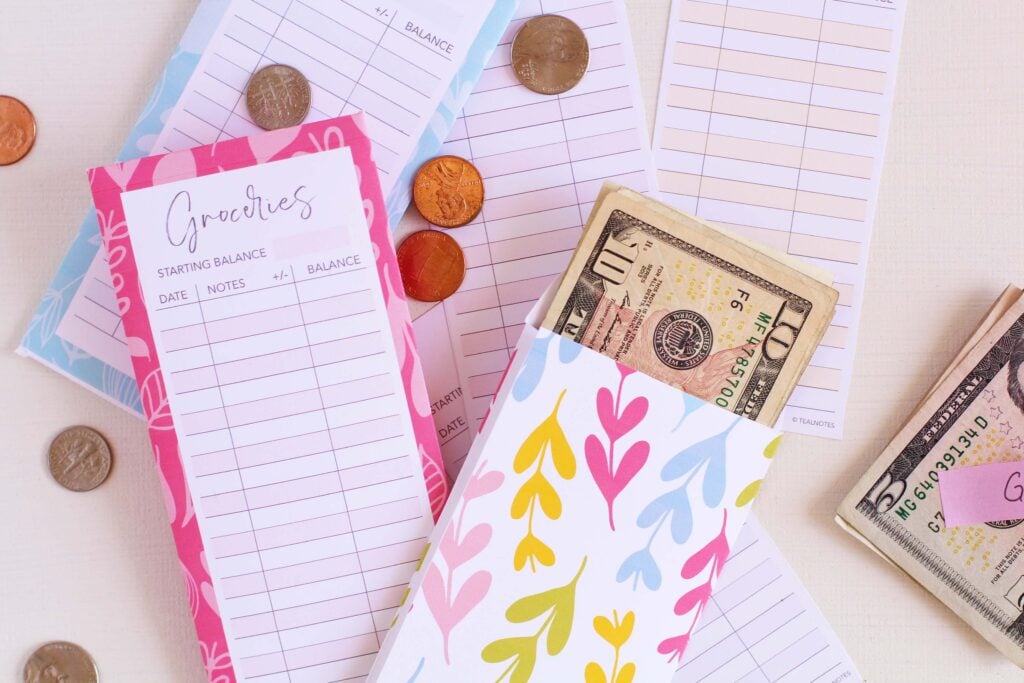Wondering what you should do if you’re barely scraping by financially? It’s a scary and stressful feeling when you are running out of money but need to make ends meet. Maybe you’re worried about how you’ll pay your bills this month, or you feel like no matter how hard you work, there’s just never enough…
Wondering what you should do if you’re barely scraping by financially?
It’s a scary and stressful feeling when you are running out of money but need to make ends meet. Maybe you’re worried about how you’ll pay your bills this month, or you feel like no matter how hard you work, there’s just never enough money left at the end of the week.
Many people have been exactly where you are right now – yes, even me. Whether you’re dealing with job loss, rising costs, debt, or something else entirely, the good news is that there are steps you can take.
What To Do if You’re Barely Scraping by Financially
Here are the steps you should take if you want to improve your financial situation.
1. Start by getting honest about your situation
It can be tempting to ignore the numbers and hope things will somehow work out, but the very first step toward improving your finances is understanding exactly where your money is going.
For at least one month, I recommend that you write down every single thing you spend money on – no matter how small. This includes bills, coffee runs, groceries, streaming subscriptions, gas, and so on.
You can use a piece of paper, a free budgeting app, or even a spreadsheet. The goal isn’t to judge yourself – it’s to see where your money is really going. Most people are surprised by how much gets lost to small, easy-to-forget purchases.
Then, total up your income and expenses. Are you spending more than you make? Are there certain areas that stand out – like eating out, entertainment, or unused subscriptions?
Knowing your numbers helps you to make better decisions because you can’t improve what you don’t track.

2. Prioritize your most important bills
Now that you’ve looked at your expenses, it’s important to focus on what matters most. To do this, you can start by listing all of your bills in order of priority and think about your basic needs first.
These are things like:
- Mortgage or rent
- Utilities (electricity, water, heat)
- Food and groceries
- Transportation (gas or bus fare to get to work)
- Insurance
These are the bills that keep your life running. If you can’t pay everything, you’ll most likely want to cover these first.
If you can’t make a full payment on something – like a credit card, personal loan, or utility bill – reach out and explain your situation. Many companies have hardship programs, especially if you’ve been a good customer in the past.
For example, some lenders may be able to:
- Lower your interest rate temporarily
- Pause payments for a month or two
- Allow you to pay a smaller minimum payment
It never hurts to ask. And, most people are surprised at how understanding creditors can be if you call them before you fall too far behind.
3. Negotiate your monthly bills
You might be able to lower several of your regular bills just by asking.
Here are a few places to start:
- Internet and phone bills: Ask about new customer discounts or cheaper plans. Sometimes, just calling and saying you’re thinking of canceling is enough for them to offer a better rate. You can say something like, “Hi, I’ve been a customer for a while, and I really like your service, but I need to lower my monthly expenses. I wanted to ask if there are any discounts or lower-priced plans available for me right now.” If they can’t help, then nicely ask to speak with the retention department – they sometimes have better deals they can give you to keep customers from canceling.
- Insurance: Shop around for new quotes every year. Also, look at prices for bundling home, auto, or renters insurance, as this can many times save you hundreds of dollars each year.
- Streaming services: You might not need multiple subscriptions at once. Pause or cancel the ones you aren’t using right now.
Even saving $50 or $75 on a few bills can add up to hundreds of dollars over a year.
Recommended reading: 10 Monthly Bills You Can Negotiate Today
4. Find ways to make extra money
Finding ways to bring in even a little extra income can make a huge difference.
And, I personally know that this is true because I first started side hustling over 10 years ago to stop living paycheck to paycheck and to pay off my debt quickly. I have done over 20 side hustles myself over the years (you can read about this at I’ve Done Over 20 Side Hustles in My Life: Here’s What I Think of Each), and I think it’s a great way to improve your financial situation.
What’s great is that you don’t have to start a new business or spend weeks waiting for a paycheck – there are easy, fast ways to start making money right away.
For example, you can start by selling items you no longer use. You can take a few hours to look around your home for things you don’t need anymore, like clothes, furniture, old electronics, tools, toys, or collectibles.
You can sell them on:
- Facebook Marketplace
- eBay
- OfferUp
- Poshmark
- Craigslist
If you price things fairly, you can make quick cash and sometimes within a day or two.
I have sold a lot of items over the years, and it’s one of the best side hustles I did back when I was living paycheck to paycheck.
Another idea is to take on in-person jobs near you, like:
- Dog walking or pet sitting
- Yard work or snow shoveling
- Babysitting
- Helping people move
- Part-time job at a retail store
If you prefer working from home, there are many easy ways to make money online, such as:
You can even combine several small income streams, like a few surveys, selling some items, and a side gig like DoorDash, to bring in hundreds of extra dollars a month.
Recommended reading:
5. Cut out unimportant spending
When money is tight, cutting expenses can feel like the only option, and while that can be necessary, you also don’t want to deprive yourself.
I don’t think you have to cut out everything that makes you happy. Instead, focus on balance and be smart about it as well!
You can start by looking through your expenses and asking: Which of these things could I pause for now?
- Could you make coffee at home instead of buying it out?
- Could you temporarily pause your gym membership or streaming service?
- Could you switch to a cheaper grocery store or use coupons?
Then, think about ways you can save money, such as:
- Get a bank account, instead of using check cashing services (these $3 to $5 fees multiple times a month really add up!).
- Look for a more affordable cell phone plan.
- Make a weekly meal plan.
- Make a large enough dinner so that you have enough for leftovers for lunch the next day.
- Scan your grocery receipts with Fetch Rewards to earn points for free gift cards.
- Cut back on delivery and takeout.
- Shop secondhand.
- Use Buy Nothing groups to get things you need for free.
- Visit your local library (they don’t have just books; sometimes they lend out tools, hiking gear, park passes, games, and more).
- Cut alcohol, coffee, and snack runs (bring coffee from home and pack snacks when you go out).
- Review your insurance premiums (you may be paying for coverage or add-ons you don’t actually need).
Even small changes, like cooking more meals at home or meal planning, can save hundreds each month.
Note: One thing you can do is try a no-spend challenge! A no-spend challenge helps you reset your habits and get creative with what you already have. Pick a time frame (like a week or a month) where you don’t spend money on anything outside of true needs. During this time, you’ll probably find new appreciation for the things you already own and realize how much money goes toward things you don’t really need. You can learn more at A No Spend Challenge Can Reset Your Finances – Here’s How To Do It.

6. Look for help and free resources
If you’re barely scraping by, please know that there’s nothing wrong with asking for help. There are programs and community resources that are there to help people through hard times.
Depending on your income, you may qualify for:
- SNAP (Supplemental Nutrition Assistance Program) – helps pay for groceries
- Medicaid – healthcare for low-income individuals and families
- Section 8 Housing – helps with rent
- Groups like The Salvation Army, United Way, and community food banks can help with utility bills, rent or housing assistance, food and household supplies.
Dial 211 from your phone to find local resources near you.
Recommended reading:
7. Start building a small emergency fund
When you’re struggling financially, the thought of saving money can feel impossible, but even a small amount of money saved can make a huge difference.
Even $5 or $10 a week is a good start. The goal isn’t to build a huge emergency fund overnight – it’s to start the habit.
For example, saving just $10 each week adds up to over $500 a year. That could help pay for a car repair, a doctor visit, or an unexpected bill without going deeper into debt (personal loans and payday loans typically have very high interest rates, so we want to avoid those as much as possible!).
If possible, you can even set up an automatic transfer to a separate savings account each payday, even if it’s just $10. When the transfer happens automatically, you’re less likely to spend it.
Recommended reading: How To Save $10,000 A Year
8. Find motivation and support
I started this very blog, Making Sense of Cents, because I wanted to talk with others who were trying to improve their financial situation and pay off their debt. So, I definitely know how helpful it is to talk with people and read about finances because it has helped me so much over the years!
There are online communities full of people sharing tips, motivation, and ideas for saving money and paying off debt. You can find support in:
- Facebook groups focused on frugal living or budgeting
- Reddit communities like r/PersonalFinance or r/Frugal
- Blogs like the one you’re reading (Making Sense of Cents), where people openly share their stories and strategies
The more you learn about personal finance, the more empowered you’ll feel. I recommend that you listen to free podcasts, read financial blogs, or check out books from your library.
Frequently Asked Questions
Below are answers to questions you may have about what to do if you’re barely scraping by financially.
What can I do if I’m struggling financially?
The first thing you can do is get clear on your income and expenses. Then, focus on paying for your basic needs first – things like rent, food, and utilities. Then, look for ways to make extra money and cut back on anything nonessential. And, don’t forget to reach out for help, as there are local assistance programs that exist for this very reason.
How can I get $1,000 ASAP?
Sell items you no longer need on sites like Facebook Marketplace or eBay. You can also take on fast-paying gigs such as food delivery, babysitting, or freelance work. Just avoid payday loans if you can, as the high interest rates can trap you in more debt.
How do pawn shops work for quick cash?
A pawn shop gives you a short-term loan based on an item you bring in, like jewelry or electronics. You’ll get cash right away, but you’ll need to repay the loan (plus interest) to get your item back. Always ask about the interest rate and terms before agreeing to a pawn. Or, you can sell your item directly to a pawn shop without a loan.
What are some free things to do if you’re barely scraping by financially?
There are tons of free or nearly free activities you can enjoy: visit local parks, check out your library for free books or movies, and attend community events. You can also join a local Buy Nothing group to get items for free.
Things To Do if You’re Barely Scraping by Financially – Summary
I hope you found my article on the things you can do if you’re barely scraping by helpful. And, I hope you are able to reach your financial goals.
No matter how stuck you may feel right now, you have the power to improve your situation. Change doesn’t happen overnight, but it can happen, and the fact that you’re reading this means you’ve already taken the first step.
What are your top tips for someone who needs to save more money right now?
Recommended reading:

